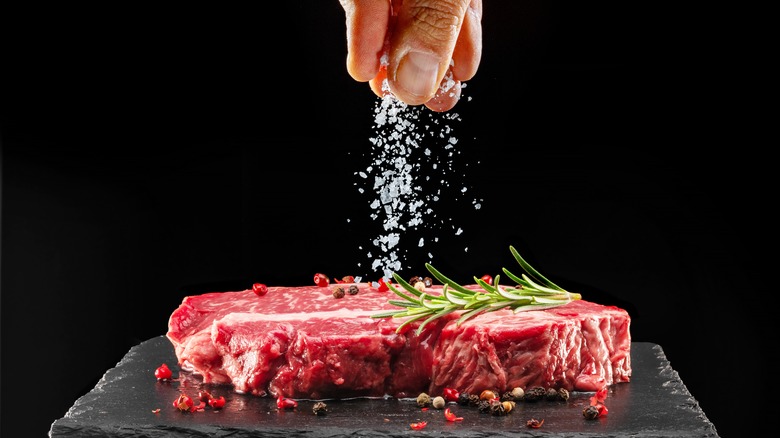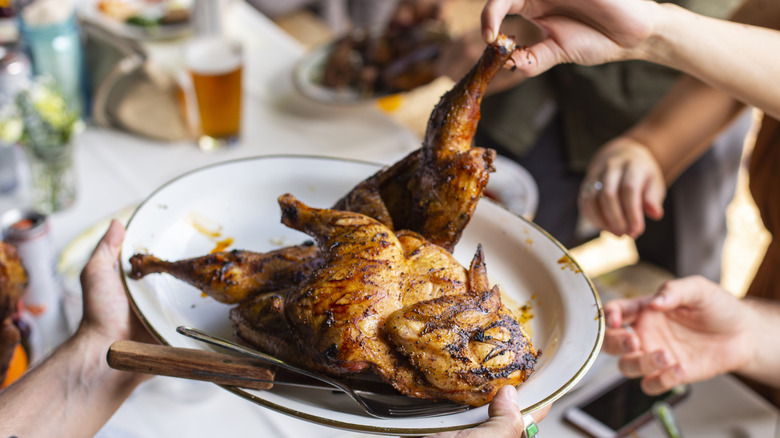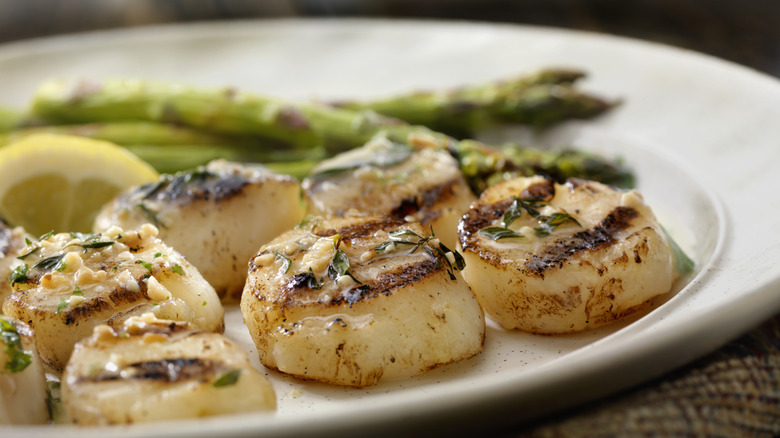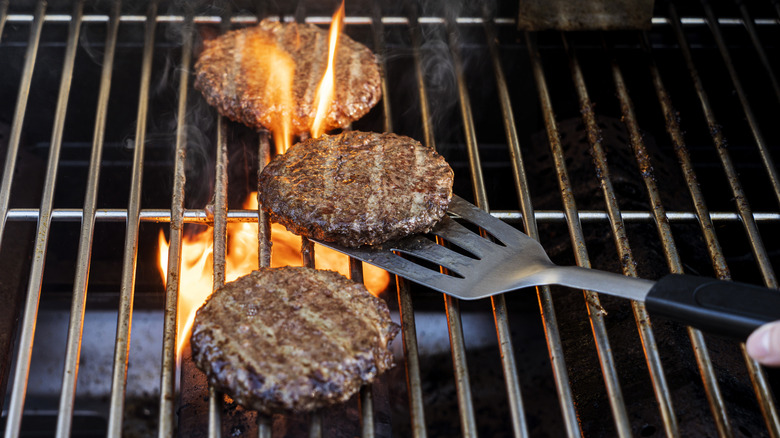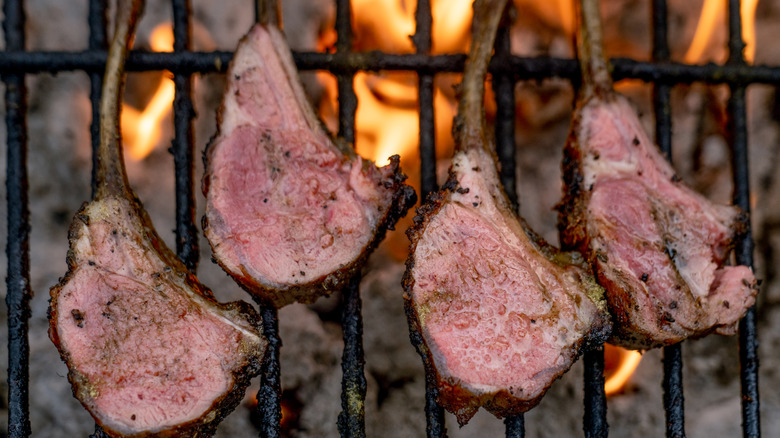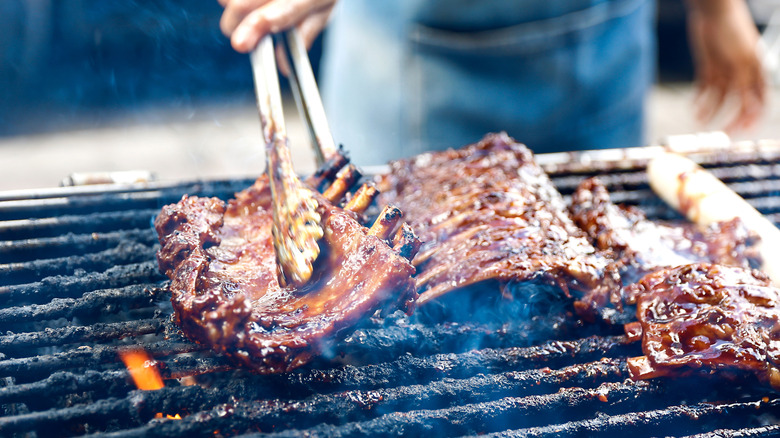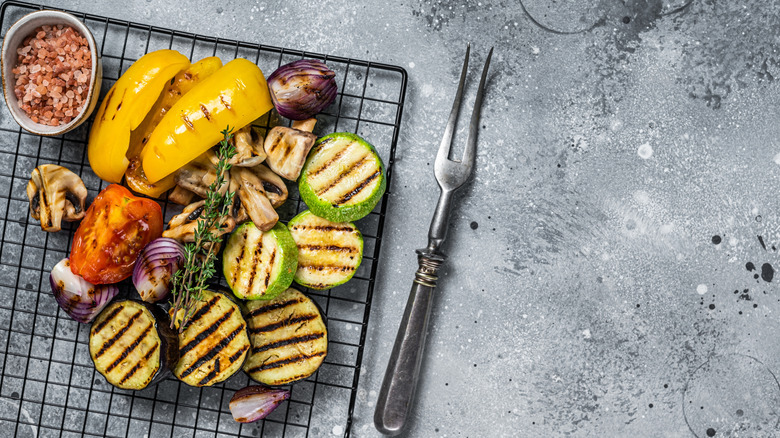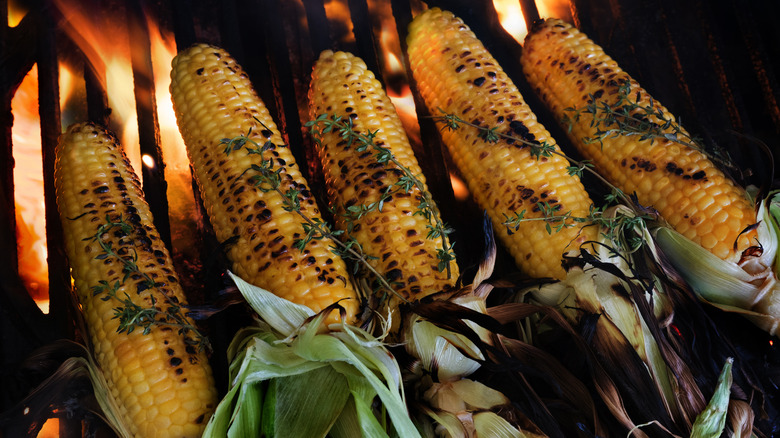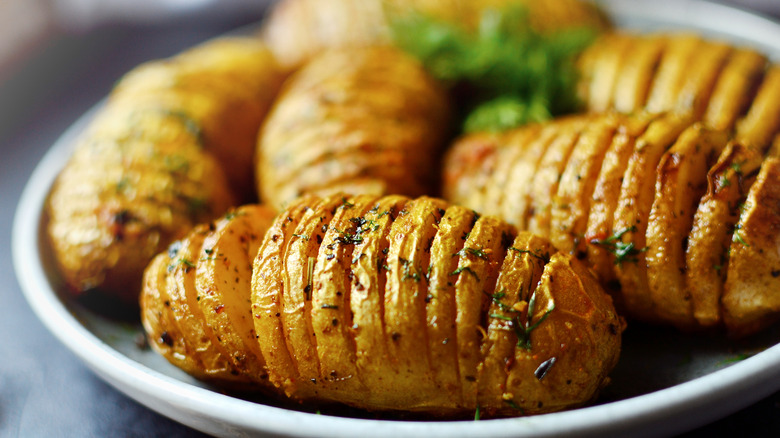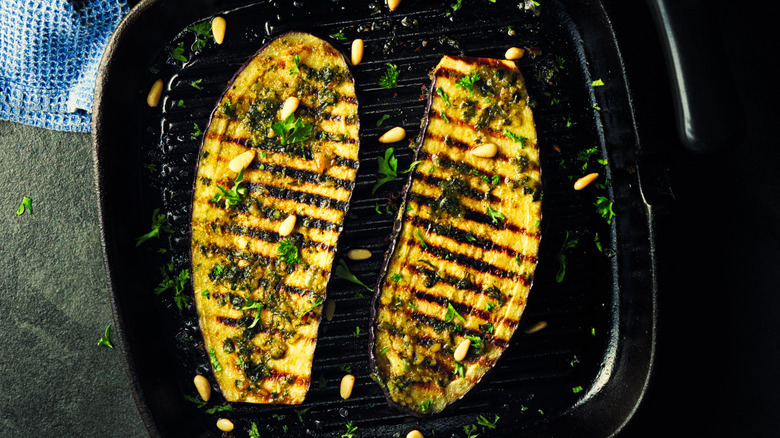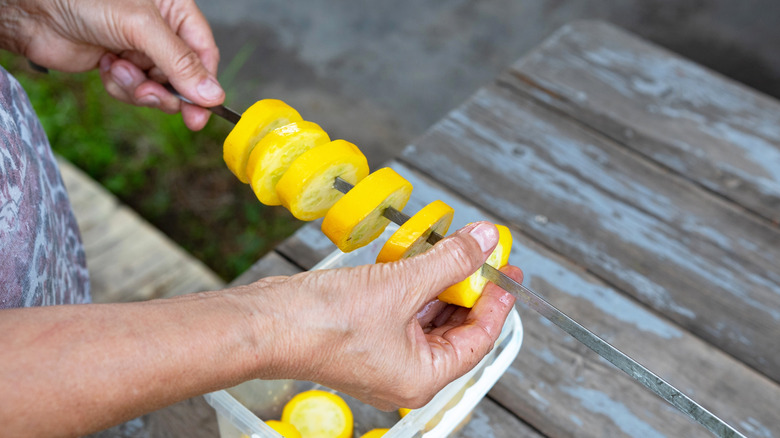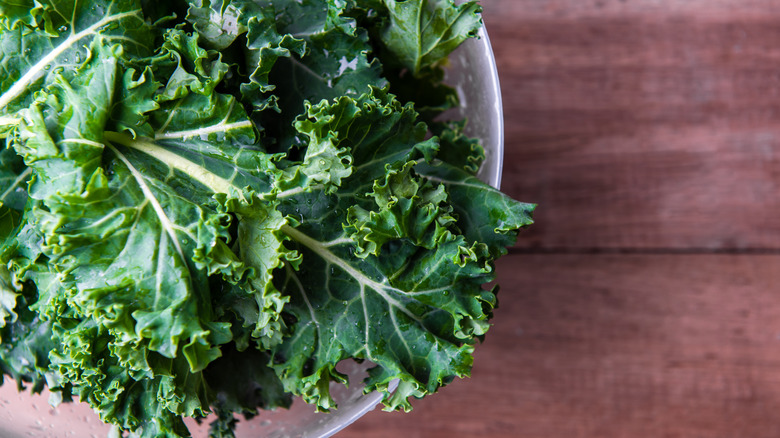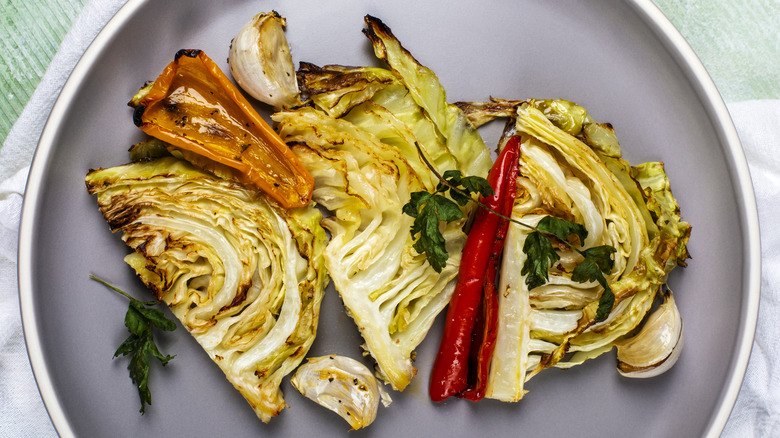14 Foods You Should Always Salt Before Grilling
Not all foods are created equal when it comes time to grill. The defining factors when it comes to salting food depend on water content, texture, and heat. After years of running a grill line, I've learned which foods benefit from salting prior to cooking, along with helpful tips that further enhance a dish and take the guesswork out of seasoning while grilling. Salting doesn't need to be a guessing game if you know how much –- and when -– to season your food. Lack of seasoning can be a big mistake when grilling, and it's something I highly recommend avoiding.
Salting serves a myriad of purposes beyond adding flavor. It can help firm up the texture of a cut of meat, or draw excess moisture out of soggy vegetables. Salt in a dry brine can even change the outcome of a dish completely if done properly. As far as versatile seasonings go, salt is at the top in regards to its benefits in grilling. Here's how you can feel like a master chef when it comes time to embody Salt Bae... But maybe don't be so heavy-handed on the pinch.
1. Steak
There's a heavy debate over salting steak prior to cooking or after. For the most part, this depends on several factors: personal preference, and whether a dry rub, brine, or basic seasoning is used. Steak should be seasoned either well in advance or just before cooking. If you're seasoning a steak in advance, this method is called a dry brine. Whereas regular brines include water, this one is liquid-free, allowing salt to really penetrate multiple layers of the meat. The process for a dry brine is simple: Pat the meat dry, apply some kosher salt liberally, and let the steak rest, ideally on a baking rack for airflow. This can be done a couple hours before grilling, but ultimately, the best flavor comes from time with a dry brine; therefore, a full eight hours (or more) is even better! Once you learn how to dry brine properly, the options are endless.
If you don't have time for a dry brine, it's fine to season a steak immediately before cooking. The process is the same with the exception of letting the meat rest. For this, you should use slightly less salt since it will only sit on top of the steak. This adds flavor to the exterior, but without a dry brine, the tenderness of the meat comes down to cooking. The steak might require another quick pat-down prior to grilling, which should take place no longer than 30 minutes after seasoning.
2. Chicken
Chicken is incredibly versatile when it comes to salt. It's also very forgiving, despite the fact that it brings its own salt level to the table. Chicken can take a dry brine just like steak, and can sit in your refrigerator for an entire day before grilling. In order to really penetrate the meat, salt needs to be in contact with chicken for at least two hours; doing so will transform the texture of the meat and create a more tender, juicy end result. This applies to both skin-on and skinless chicken. When combined with a dry rub, crispy skin is elevated and turned into a symphony vs a one-note poultry dish.
If you're looking for as much flavor as possible, consider an actual brine. Wet brines are great for chicken because they tenderize while adding flavor, and actually add moisture to meat that wasn't already there. The best part about a wet-brined chicken is that it doesn't need a heavy marinade. Something light is all you need to make this dish sing, since it was well-seasoned long before it ever hit the grill. The good news is that if you ever over-salt your chicken, you can always just throw it in a salad and no one will know the difference.
3. Fresh scallops
Scallops are delicate and should be treated as such. After many overcooked hockey pucks, I learned the simpler, the better. Scallops don't need much in the way of seasoning unless you're marinating them. A little salt, pepper, and butter sauce go a long way when it comes to high-quality shellfish. Although this sounds simple, it can very quickly go wrong if you salt too far in advance.
The risk of tough scallops increases with every minute they're in contact with salt before being cooked. Like most seafoods, they cook very quickly, meaning salt can dry them out before they're fully cooked. Salting up to a half hour prior to grilling is fine, but anything longer than that might draw out too much moisture. So while they should be salted prior to grilling, these –- and most seafood -– do not follow the dry brine rule. If you're feeling daring, you can try a wet brine, but even this should only be done an hour before grilling. Either way, salt is one of the most important seasonings for seafood.
4. Burgers
Salting burgers can be a tricky process if you're not familiar with salt and protein reactions. Salting the meat before patties are formed is a no-go and results in a tough burger. The best practice I've always followed is to salt the patties immediately before they hit the grill. This adds flavor but doesn't allow the salt to penetrate deep enough to affect the texture of the meat. If you season the patties just before grilling, you can be a little more heavy-handed with the salt without worrying about creating a chewy burger.
You should always be wary of pre-made dry rubs, which might contain salt and change the texture of your burgers. If you're dry-seasoning your patties and letting them sit in the refrigerator, this could explain why they're not as tender as you wanted. Burgers are not something worthy of a dry brine, but you can salt them again after grilling to boost flavor. Pro tip: Leave aside a small bit of seasoned patty meat and grill this first, then try it. It'll be a good indicator as to whether you need to add more salt or other seasonings.
5. Lamb chops
Lamb chops are a blast to cook on the grill because they're so versatile. They aren't water-dense and can handle being salted at least an hour prior to grilling. In fact, the meat itself is gamey enough that it can handle being salted up to 24 hours in advance, making this a surprisingly good choice for beginners on the grill. If you spend a bit more to get these pre-trimmed, all you need to worry about is how to cook them. Depending on how much flavor you're looking for, you can experiment with your salting technique.
A dry brine always results in a more balanced flavor, but salting an hour or two prior to grilling will get the job done and is fine for marinated or basted chops. For even more flavor, use mesquite chips when grilling lamb chops as they add a nice smoky flavor that is complemented by a well-seasoned base.
6. Ribs
Ribs appreciate a good dry brine. They can handle the intensity of salt for longer periods of time, although I wouldn't let them sit for longer than 24 hours; ideally, ribs should be salted and left to dry brine overnight. Salt draws moisture out, but settles back into the meat due to the extended amount of time on a dry brine. One thing to be wary of is how much salt you use for a dry brine, because it should be left on when it comes time to grill.
If you're concerned about adding too much salt for a dry brine, a wet brine might be easier. The benefit of this method is that you can introduce things like apple cider vinegar, garlic, and even brown sugar. Layering flavors this way adds depth to ribs, and enhances the taste of the baste or marinade you serve along with them.
7. Zucchini
If you've ever cooked spinach for quiche or spanakopita, then you know salting is necessary to squeeze out excess water. Zucchini is 95% water, which seems hard to believe, until you throw it on the grill and it falls apart. In this case, we want salt to dry out the vegetable in order to achieve crispy results. You should salt your zucchini at least 10 minutes prior to grilling, and let it sit in a colander while it sheds water. Before grilling, pat it dry to remove any moisture that could steam on the grill, leading to soggy veggies.
The cut of the zucchini also matters when it comes to maintaining the integrity of its shape. As aesthetic as thin slices look, you'll have better luck with thick-cut slices. Half-inch slices or medium to large dices hold up well when grilling. Pro tip: In my experience, zucchini rounds are the way to go because they're easy to cut, and you can slice them slightly thicker than a half-inch because they're smaller.
8. Corn
There's no special trick regarding moisture content here, corn just loves a good salt! It provides a sweet foundation for any number of seasonings, but this is also why it tastes so much better when you salt it beforehand. While you can salt corn immediately after grilling, doing so ahead of time locks in flavor and produces a more tender result.
For the most flavor after grilling, some people prefer to wet brine their corn. If you have the time, this is a method that I wholeheartedly support. Wet brined corn is a perfect match for the grill, where high heat tends to draw out more moisture than the oven or stovetop. After brining, you don't need to salt again, but it does go well with butter and some ancho chili or smoked paprika. You can even use some smoked salt if you're feeling extra daring. For the best flavor, create direct and indirect heating zones, so you can char your corn on one side and let it slow-cook on the other.
9. Potatoes
An unsalted potato, quite honestly, is a travesty. There's no greater disappointment than biting into a grilled potato, only to realize it lacks any flavor. This is one vegetable that can handle most seasonings you throw at it, but salt is an absolute necessity. Not only that, but when and how you add the salt is fairly versatile.
You can salt diced potatoes prior to grilling, or you can go one step further and brine them. I brine my potatoes for everything except mash, and it has been life-changing. My grandmother's potato salad never tastes the same if I don't let my potatoes sit in a saltwater and vinegar bath overnight. Bonus: If you add vinegar to your brine, your potatoes will taste just like salt and vinegar chips! No matter which form your potatoes are in, it's always a good idea to hit them with some salt post-grill too.
10. Eggplant
Eggplant has a high water content that makes it prone to getting soggy on the grill. Without salt, you'll end up with a mushy mess, and will have sacrificed the vegetable for a sodden side dish. Salting is the only way to draw out that extra moisture, and it will get you a crispier slice of eggplant that retains its integrity. Since the veggie is about 92% water, it follows the same rule as zucchini and squash; you'll need to salt your eggplant and let it sit for at least 10 minutes before patting it dry.
Cutting the eggplant on the thicker side will also help with this, and gives it more space to absorb the seasonings with which it's prepped. It can also be cut into ½-inch strips, and doing so can even help with grill marks. This vegetable might not seem all that impressive, but with a little salt and some 90-degree turns on the grill, it'll look like a five-star dish.
11. Summer squash
Summer squash follows suit with zucchini and eggplant, despite having a slightly firmer texture. Unfortunately, this means nothing when 95% of the vegetable is made of water. The rule of thumb here is to use 1 teaspoon of salt per pound. This will draw out extra moisture and keep the squash from disintegrating. You can cut it into ½-inch slices or big dice, but the process is the same.
For squash and other waterlogged vegetables, you should leave the salt on the outside. Rinsing this off is counteractive to the salting process and might reintroduce more water content. Don't forget that salt also helps with grill marks, so the drier the exterior, the prettier the food. Since summer squash is used commonly on kebobs alongside zucchini, you can salt them both at the same time to enhance the flavor of the dish. If you're using bell peppers or mushrooms, avoid salting these before grilling so they brown properly.
12. Kale
Salting kale before grilling is two-fold. First, it gives it flavor and cuts down on the bitterness of its leaves. Second, massaging salt into the kale works as a great tenderizer. The leaves can be very tough and fibrous without this step, which is even more unpleasant after it's a little charred.
Whereas salt draws out moisture for many other vegetables, it's only enhancing the flavor of the kale. If you do this, there's no need to rinse the kale, either; simply salt, massage, grill, and eat! For the best results, let it sit with the salt for up to 10 minutes before massaging. This will result in ultra tender kale, and you'll be able to try a piece before grilling to check the seasoning. For an extra pop of flavor and freshness, squeeze some fresh lemon over it before massaging it; when it hits the grill, it creates an intense aromatic and adds zesty flavor.
13. Cabbage
Cabbage has been crowned as one of the most versatile vegetables in recent years, and for good reason; it's a great substitute for keto and low-carb lifestyles, and offers plenty of nutrition for plant-based diets. The emergence of the cabbage steak is still trending and it's worth trying, but only if you salt the cabbage first. Doing so will draw moisture out, which makes the final dish crunchy rather than soggy.
When it comes to grilling, a cabbage steak should be treated like anything else that needs a flavor boost before hitting the grill. Salt will aid you in your quest to get a char that mimics steak. An added bonus is that it won't need to be salted as heavily after grilling, if at all. To bolster this flavor, try adding a dry rub or a light marinade after salting. I love it with a little barbecue sauce, fresh herbs and butter, or just good 'ol steak sauce.
14. Asparagus
Asparagus is highly underrated in my opinion. Many people avoid cooking it on the grill because of its tendency to fall through the grates, but it's worth the effort. Salt is a huge help in tenderizing the asparagus stalk, but also encourages a nice char on the outside. Prep should always involve cutting off roughly ½ to 1 inch of the base; you can take it a step further by shaving some of the outer stalk off before salting. However, no amount of trimming is a substitute for salt.
To go the extra mile, you could also wet brine it. This will give your asparagus some powerful flavor that penetrates all the way through, rather than just sitting on the top layer of the skin. Salt is a beautiful complement to the subtle sweetness of grilled asparagus, so it'll be delicious no matter how you incorporate it.

